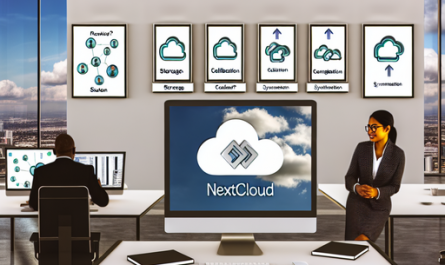Nextcloud and Customer History: Transform Your Business Operations
In today’s competitive market, managing customer relationships effectively is crucial for business success. Nextcloud, a versatile and open-source cloud platform, offers a comprehensive suite of applications designed to enhance your business operations. One such powerful tool is the Nextcloud Customer History app. In this article, we’ll delve into how Nextcloud, combined with the Customer History app, can revolutionize the way you manage customer interactions, streamline data processes, and ultimately drive business growth.
Understanding Nextcloud
Nextcloud is an open-source platform that provides a private cloud solution for businesses and individuals alike. It allows users to store, manage, and share data securely. With features like file sharing, calendar management, contact synchronization, and collaborative office document editing, Nextcloud serves as a strong alternative to proprietary cloud services. One of the significant benefits of Nextcloud is its ability to host data on your servers, giving you complete control over your information, thereby enhancing security and privacy.
Get Nextcloud with 1 TB of storage for just up to €3.99 per month.
Try it now for one month free and risk-free.
Advantages of Using Nextcloud
- Enhanced Data Security: Nextcloud ensures that your data remains private and secure, eliminating the risk associated with third-party cloud providers.
- Customizability: Being open-source, Nextcloud offers extensive customization options to fit your unique business needs.
- Cost-Effective: With no licensing fees, Nextcloud is an economical solution for businesses of all sizes.
- Collaboration Tools: Nextcloud’s vast array of collaboration tools ensures seamless teamwork among employees.
What is the Nextcloud Customer History App?
The Nextcloud Customer History app is an essential tool for businesses aiming to track and manage customer interactions and history. This app integrates seamlessly with the Nextcloud environment, providing a centralized location to store and manage customer-related data. By utilizing this app, businesses can gain insights into customer behaviors, preferences, and previous interactions, facilitating better decision-making and personalized customer service.
Key Features of the Nextcloud Customer History App
- Centralized Data Management: Aggregate all customer-related information in one place, eliminating the hassle of managing multiple databases.
- Detailed Interaction Logs: Keep a comprehensive record of all interactions with each customer, including calls, emails, and meetings.
- Customer Insights: Gain valuable insights into customer behavior and preferences to tailor your services and products effectively.
- Integration with Other Apps: Seamlessly integrate with other Nextcloud apps like Contacts and Calendar for a unified customer management experience.
- User-Friendly Interface: Enjoy an intuitive and easy-to-use interface that simplifies data entry and retrieval.
How Nextcloud and Customer History App Enhance Business Operations
Integrating Nextcloud with the Customer History app provides a multitude of benefits that can enhance various business operations:
1. Enhanced Customer Relationship Management (CRM)
One of the primary advantages of using the Nextcloud Customer History app is its capability to enhance your CRM. By maintaining a detailed and organized database of customer interactions, businesses can better understand their customers’ needs and preferences. This, in turn, enables personalized communication and service, thereby fostering stronger customer relationships.
2. Improved Sales Performance
Sales teams can significantly benefit from the insights provided by the Customer History app. By analyzing past interactions and purchase history, sales professionals can identify potential upsell opportunities, predict customer needs, and develop targeted sales strategies. This ultimately leads to improved sales performance and higher revenue.
3. Efficient Marketing Strategies
Effective marketing requires a deep understanding of your target audience. With the Nextcloud Customer History app, marketers can analyze historical data to identify trends and patterns in customer behavior. This information can be used to develop more effective marketing campaigns, resulting in higher engagement and conversion rates.
4. Streamlined Customer Support
Customer support teams can leverage the Nextcloud Customer History app to access detailed records of previous interactions with customers. This enables them to provide quicker and more effective support, as they can reference past issues and resolutions. Enhanced support leads to higher customer satisfaction and loyalty.
Step-by-Step Guide to Setting Up the Nextcloud Customer History App
Setting up the Nextcloud Customer History app is a straightforward process. Follow these steps to integrate this powerful tool into your Nextcloud environment:
Step 1: Install Nextcloud
If you haven’t already, start by installing Nextcloud on your server. You can download the latest version from the official Nextcloud website. Follow the installation guide to set up and configure your Nextcloud instance.
Step 2: Access the Nextcloud App Store
Once Nextcloud is up and running, log in to your Nextcloud account and navigate to the App Store. The App Store is where you can find and install various Nextcloud apps to enhance your platform’s functionality.
Step 3: Install the Customer History App
Search for the Customer History app in the App Store and click on „Install“. The installation process is quick and straightforward.
Step 4: Configure the App
After the installation is complete, access the Customer History app from your Nextcloud dashboard. Configure the app according to your business needs, such as setting up custom fields for data entry, integrating with other Nextcloud apps, and defining user permissions.
Best Practices for Using the Nextcloud Customer History App
To maximize the benefits of the Nextcloud Customer History app, consider the following best practices:
1. Regular Data Updates
Ensure that customer data is updated regularly. Outdated or incomplete information can hinder your ability to make informed decisions. Establish a routine for updating customer records to maintain accuracy and relevance.
2. Train Your Team
Provide thorough training for your team on how to use the Customer History app effectively. Familiarizing them with the app’s features and functionalities will ensure consistent and efficient data management.
3. Utilize Data Insights
Regularly analyze the data stored in the Customer History app to gain insights into customer behavior and preferences. Use these insights to tailor your products, services, and marketing strategies for better customer engagement and satisfaction.
4. Leverage Integration
Take advantage of the app’s integration capabilities with other Nextcloud apps. For example, syncing with the Contacts app can enhance your CRM by providing a holistic view of customer information.
Case Study: Success Story with Nextcloud and Customer History App
To illustrate the practical benefits of using Nextcloud and the Customer History app, let’s explore a real-world success story:
Company Overview
XYZ Corp is a mid-sized e-commerce company that specializes in electronics. With a rapidly growing customer base, XYZ Corp needed a robust solution to manage customer interactions and history effectively.
Challenges Faced
Before implementing Nextcloud, XYZ Corp faced several challenges:
- Fragmented Data: Customer information was scattered across multiple databases and spreadsheets, making it difficult to access and manage.
- Inefficient Communication: Lack of a centralized system led to communication gaps between different departments, resulting in inconsistent customer interactions.
- Limited Insights: Without a comprehensive view of customer history, XYZ Corp struggled to gain insights into customer behavior and preferences.
Solution Implemented
To address these challenges, XYZ Corp integrated Nextcloud with the Customer History app. The setup included:
- Centralized Data Management: The Customer History app provided a single platform to store and manage all customer-related data, eliminating fragmentation.
- Improved Collaboration: Integration with Nextcloud’s collaborative tools facilitated seamless communication between departments, ensuring consistent interactions with customers.
- Data Insights: By analyzing historical data, XYZ Corp gained valuable insights into customer behavior, helping them tailor their marketing strategies and enhance customer service.
Results Achieved
The implementation of Nextcloud and the Customer History app led to significant improvements for XYZ Corp:
- Increased Sales: Tailored marketing campaigns based on customer insights resulted in a 20% increase in sales.
- Enhanced Customer Satisfaction: Improved communication and personalized service led to higher customer satisfaction scores.
- Efficient Data Management: Centralized data management streamlined operations and saved significant time for the team.
Conclusion
In conclusion, integrating Nextcloud with the Customer History app offers immense benefits for businesses looking to enhance their customer relationship management, sales performance, and overall operational efficiency. By centralizing customer data, providing valuable insights, and facilitating collaboration, this powerful combination can drive business growth and success. Whether you’re a small business owner or part of a large enterprise, Nextcloud and the Customer History app are worth exploring to transform your business operations.
For more information on Nextcloud and its applications, visit the official Nextcloud website and start your journey towards efficient and secure data management today.




